
Mohini Ekadashi is particularly revered for the divine manifestation of Vishnu in his Mohini form, where he enchanted the demons during the churning of the ocean to ensure the gods received the nectar of immortality. As a symbol of the divine victory over illusion and ignorance,
Mohini Ekadashi holds deep meaning in the hearts of those seeking spiritual progress. In 2026, it will be observed on Monday, April 27 , and serves as a time for fasting, prayer, and devotion. The observance of this day purifies the soul and helps remove negative karmas accumulated over lifetimes, inviting the blessings of peace, prosperity, and protection.
As a day that symbolizes the triumph of truth and goodness over deception and darkness, it encourages individuals to conquer their inner demons and distractions, making space for spiritual growth. By devoutly following the practices of this Ekadashi, devotees seek liberation from sins and the grace of Bhagwan Vishnu, who grants them the path to ultimate victory and eternal bliss.
Festival Date, Time, Muhurat & Tithi
Mohini Ekadashi 2026 will be observed on Monday, April 27, 2026.
11th lunar day (Ekadashi) of the Vaishakha month as per the lunar calendar.
Key Timings for Mohini Ekadashi 2026:
Mohini Ekadashi on Monday, April 27, 2026
On 28 th Apr, Parana Time - 06:12 AM to 08:46 AM
On Parana Day Dwadashi End Moment - 06:51 PM
Ekadashi Tithi Begins - 06:06 PM on Apr 26, 2026
Ekadashi Tithi Ends - 06:15 PM on Apr 27, 2026
Note: Sunrise and sunset vary by region and date due to India's geographical diversity. For exact timings, please refer to local astronomical data.
Significance & Importance of Mohini Ekadashi
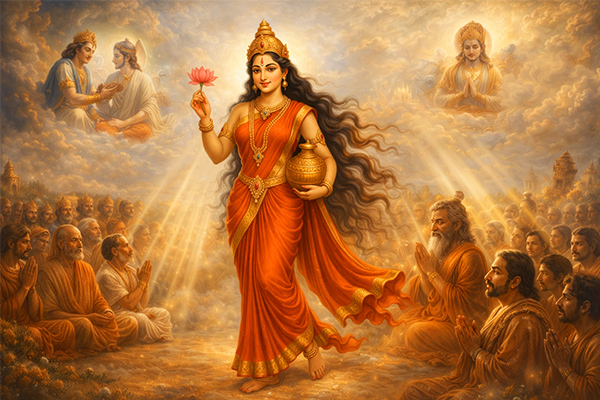
Mohini Ekadashi holds profound spiritual significance, offering a pathway to liberation from sins and all forms of suffering. According to sacred texts and ancient legends, observing the fast on Mohini Ekadashi brings divine grace and ensures that the devotee’s soul is cleansed of past karmas. One of the most revered stories associated with this Ekadashi is that of Bhagwan Shri Ram, who, upon hearing the immense benefits of this fast from Sage Vasishtha, observed it diligently. Bhagwan Ram's example reinforces the profound power of Mohini Ekadashi, illustrating that even the greatest of beings recognize its spiritual potency.
This Ekadashi is not just about physical fasting, but is also deeply transformative on a mental and spiritual level. It is said that Mohini Ekadashi removes the veil of illusion that binds individuals to the transient world of material existence, helping them see the truth and focus on their eternal soul. This day is a sacred opportunity for devotees to renounce worldly distractions and immerse themselves in spiritual practices, such as chanting, meditation, and prayer, to strengthen their connection with the Divine.
In the Mahabharata , Bhagwan Krishna himself describes the supreme importance of Mohini Ekadashi to Yudhishthira, proclaiming that observing this fast is far more auspicious than even the most noble acts like giving charity, performing grand sacrifices, or even witnessing the Bhagwan's divine form. Krishna's words highlight that the merit gained through Mohini Ekadashi is unparalleled, purifying the heart and soul of the devotee, and leading them closer to eternal peace and salvation. According to the scriptures, one who adheres to the fast with sincerity and devotion, following the prescribed rules and regulations, is assured of liberation and a place in the eternal abode of Bhagwan Vishnu. This ultimate spiritual gift underscores the transformative power of this sacred day and its potential to guide devotees towards the path of moksha (liberation).
Thus, the observance of Mohini Ekadashi is not merely an act of fasting but a profound spiritual practice that transcends time and space, offering devotees the divine opportunity to free themselves from the bonds of ignorance and material attachment. The day calls upon the devotee to live in alignment with the principles of dharma (righteousness), helping them purify their mind and soul while gaining the blessings of Bhagwan Vishnu, who leads them to the ultimate truth and liberation.
Story of Mohini Ekadashi Festival
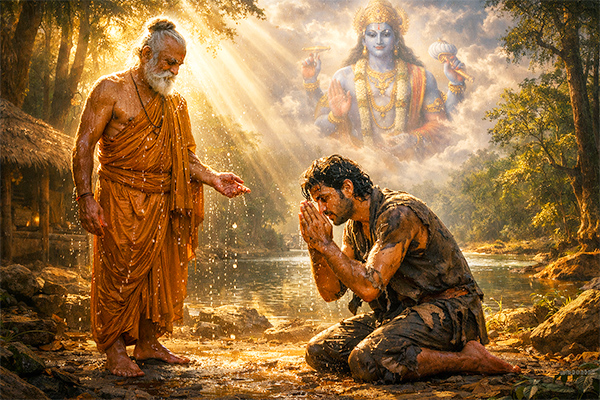
In the prosperous kingdom of Bhadravati, nestled on the banks of the sacred Saraswati River, reigned the wise and righteous King Dyutiman. A monarch of great virtue, he governed with a deep sense of justice and spirituality. Among the kingdom’s wealthy and respected citizens was a devout merchant named Dhanapala. Known for his generosity, Dhanapala regularly offered charity, particularly distributing food grains to the poor and needy. He had five sons—Sumana, Sadbuddhi, Medhavi, Sukriti, and Dhrishthabuddhi. While his four sons were virtuous and followed the path of righteousness, Dhrishthabuddhi, the youngest, was drawn into a life of vice and sin.
Dhrishthabuddhi indulged in every kind of indulgence-gambling, drinking, gambling, illicit relationships, and other sinful activities. He spent all his father’s wealth on his pleasures and neglected his responsibilities. In time, his immoral behavior became intolerable to Dhanapala, and in a fit of anger, the father expelled Dhrishthabuddhi from his home, hoping to teach him a lesson. Alone and destitute, Dhrishthabuddhi squandered every penny, including the riches he had inherited, and was soon abandoned by those who had once kept company with him. Without money, friends, or resources, he fell into despair.
Desperate and filled with shame, Dhrishthabuddhi turned to theft to survive, stealing from the citizens of Bhadravati. But his misdeeds were soon discovered. The king’s constables caught him, whipped him, and cast him out of the kingdom. Now a wandering outcast, he ventured deep into the forest, living a miserable existence by hunting and eating wild animals.
In the midst of his suffering, during the auspicious month of Vaisakh, Dhrishthabuddhi arrived at the Ashram of Kaundinya Muni, a renowned sage known for his spiritual wisdom and deep devotion to Bhagwan Vishnu. At that very moment, the sage had just bathed in the sacred waters of the Ganges. As the last drops of water fell from his body, they unexpectedly splashed onto Dhrishthabuddhi’s sinful form. Miraculously, those droplets of water brought a profound transformation in the young man’s heart. For the first time, he became fully aware of the gravity of his wrongdoings. His heart, once shrouded in darkness, was illuminated by the light of wisdom.
With a deep sense of remorse, Dhrishthabuddhi fell at the feet of Kaundinya Muni, his hands folded in humility. “O revered sage,” he pleaded, “I have lived a life of sin and destruction. I am now lost and seek your guidance. What can I do to absolve myself from the torment I have caused to myself and others?”
Kaundinya Muni, with compassion in his eyes, kindly advised, “To cleanse yourself of the sins you have committed, you must observe a fast on the upcoming Mohini Ekadashi. This sacred day, dedicated to Bhagwan Vishnu, has the power to purify even the most sinful of hearts. If you fast according to the prescribed rules and approach Bhagwan Vishnu with true devotion, your sins will be forgiven, and you will find peace.”
Taking the sage’s words to heart, Dhrishthabuddhi vowed to follow the path of redemption. When Mohini Ekadashi arrived, he observed the fast with unwavering faith, following the instructions of Kaundinya Muni. On this auspicious day, he devoted himself entirely to prayer, meditation, and chanting the sacred names of Bhagwan Vishnu, seeking his mercy.
By the grace of Bhagwan Vishnu, Dhrishthabuddhi’s heart was purified, and all his sins were washed away. Not only was he absolved of his past misdeeds, but he was also rewarded with a place in the eternal abode of Bhagwan Vishnu. His life, once full of darkness and despair, had been transformed through the power of devotion and the mercy of Bhagwan Vishnu.
Bhagwan Krishna, who had been narrating this story to Yudhishthira in the Mahabharata , concluded with a profound teaching: 'O Yudhishthira, whoever listens to the glories and merits of Mohini Ekadashi, or observes the fast with sincerity, will be blessed with the same divine grace. Even hearing the story of this sacred day brings tremendous spiritual benefit. Those who fast with devotion are assured liberation and eternal bliss in Bhagwan Vishnu’s divine presence.'
Thus, the story of Dhrishthabuddhi stands as a powerful testament to the transformative power of Mohini Ekadashi—a day that can redeem the most fallen souls and guide them towards divine salvation.
How to celebrate Mohini Ekadashi
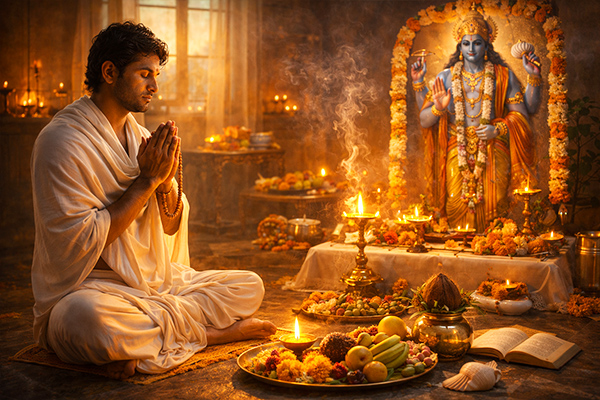
Mohini Ekadashi is an auspicious day dedicated to Bhagwan Vishnu, and observing this day with devotion can help cleanse the mind and soul. To celebrate Mohini Ekadashi, it is essential to follow the traditional fasting and worship practices. The fast begins on the night of the 10th lunar day (before Ekadashi) and lasts until the morning of the 11th day, also known as Ekadashi. Devotees typically refrain from eating grains, pulses, and other rich foods, focusing on fruits, vegetables, and other simple foods. The fast should be observed with a spirit of devotion and self-discipline, as it is believed to purify the soul and bring spiritual benefits.
On the day of Ekadashi, devotees wake up early in the morning and take a ritual bath, which is considered a way to purify oneself before engaging in worship. The fasting is accompanied by prayers, meditation, and the chanting of Bhagwan Vishnu’s names, such as the Hare Krishna Maha Mantra . Devotees often visit temples dedicated to Bhagwan Vishnu, offering flowers, incense, and lighted lamps as a mark of their devotion. Some devotees also observe a complete fast, while others may opt for a partial fast, depending on their ability.
Throughout the day, it is customary to read or listen to the stories and scriptures related to Bhagwan Vishnu, such as the Vishnu Purana , which highlight the significance of Mohini Ekadashi. The essence of the day is to surrender oneself to Bhagwan Vishnu and seek his blessings for spiritual progress, protection from negative influences, and liberation from past sins. The fast is broken the following morning, on the Dwadashi day, after performing rituals and offering prayers to Bhagwan Vishnu, completing the observance of this sacred day.
By observing Mohini Ekadashi with sincerity, devotees believe they can remove the veil of illusion, purify their minds, and be blessed with peace, prosperity, and divine grace.
Mohini Ekadashi Festival Puja Vidhi (Puja Procedure)
_202001.jpg)
The puja on this day is performed to seek Bhagwan Vishnu’s blessings for spiritual growth, prosperity, and liberation from sins.
Here’s a procedure to observe the puja:
Puja Vidhi:
- Preparation for Fasting : Begin by preparing yourself mentally for the fast. Avoid grains and other rich foods, and instead, focus on fruits and vegetables if you plan to follow a partial fast.
- Wake Up Early : On the morning of Ekadashi, wake up early before sunrise and take a ritual bath to purify yourself.
- Cleanse the Puja Area : Clean your home and the area where you will perform the puja. Place a clean cloth on the altar or a suitable platform.
- Set Up the Altar : Place an idol or picture of Bhagwan Vishnu on the altar. Decorate it with fresh flowers and incense sticks.
- Lighting the Lamp : Light a lamp or diya in front of Bhagwan Vishnu’s image to symbolize the presence of divine light.
- Chanting Vishnu’s Name : Chant Bhagwan Vishnu’s sacred mantras such as the Hare Krishna Maha Mantra or other Vishnu stotras like Vishnu Sahasranama .
- Offering Flowers & Fruits : Offer flowers to Bhagwan Vishnu while praying with devotion. You may also offer fruits and coconut as a symbol of gratitude.
- Praying for Forgiveness : Ask for forgiveness for past mistakes and sins, and seek Bhagwan Vishnu’s blessings for peace, prosperity, and spiritual progress.
- Reading Scriptures : Read or listen to stories of Bhagwan Vishnu, especially those related to Mohini Ekadashi, which describe the importance and benefits of the fast.
- Break the Fast : The fast should be broken on the morning of Dwadashi (the day after Ekadashi) by consuming light food like fruits or milk, after offering prayers to Bhagwan Vishnu.
By following this procedure, devotees can effectively celebrate Mohini Ekadashi and receive the divine blessings of Bhagwan Vishnu. The fast, prayer, and devotion help cleanse the soul and bring peace, prosperity, and spiritual growth.
Mohini Ekadashi Puja Mantra
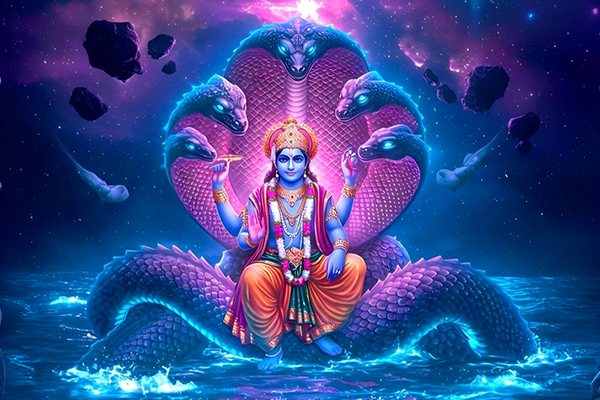
Mohini Ekadashi is a significant day dedicated to Bhagwan Vishnu, observed by devotees through fasting and prayer. Reciting specific mantras during this day is believed to bring spiritual benefits and blessings.
Here are some powerful mantras to chant on Mohini Ekadashi:
ॐविष्णवेनमः (Om Vishnave Namah)
This mantra is a salutation to Bhagwan Vishnu, acknowledging his omnipresence and supreme power.
ॐनमोभगवतेवासुदेवायनमः (Om Namo Bhagavate Vasudevaya Namah)
A revered mantra that praises Bhagwan Vishnu as the divine Vasudeva, the source of all creation.
ॐहूंविष्णवेनमः (Om Hoom Vishnave Namah)
A mantra invoking the protective and sustaining qualities of Bhagwan Vishnu.
श्रीकृष्णगोविन्दहरेमुरारे।हेनाथनारायणवासुदेवाय।। (Shree Krishna Govinda Hare Murare. He Nath Narayan Vasudevaya.)
A devotional chant expressing surrender to Bhagwan Krishna, acknowledging his roles as Govinda, Murari, and Vasudeva.
ॐनारायणायविद्महे।वासुदेवायधीमहि।तन्नोविष्णुप्रचोदयात्।। (Om Narayanaya Vidmahe. Vasudevaya Dhimahi. Tanno Vishnu Prachodayat.)
A Gayatri mantra dedicated to Bhagwan Vishnu, seeking his guidance and enlightenment.
Chanting these mantras with devotion on Mohini Ekadashi is believed to purify the mind, remove sins, and bring spiritual progress. Reciting them 108 times is considered particularly auspicious.
Mohini Ekadashi Vrat Vidhi (Fasting Procedure)
_202004.jpg)
To observe the Mohini Ekadashi vrat, begin by preparing yourself mentally and physically the day before Ekadashi. On the night before the fast, make sure to clean your home and your puja area. It’s important to purify your mind and heart with positive thoughts and intentions. You can begin your fast by abstaining from grains, pulses, and other heavy foods, consuming only fruits, vegetables, and light food if necessary. Some devotees choose to fast completely without food or water, while others may take fruits or milk.
On the morning of Ekadashi, wake up early before sunrise, take a ritual bath to purify yourself, and wear clean clothes. Sit in a quiet place and set up an altar with a picture or idol of Bhagwan Vishnu. Offer fresh flowers, incense, and a lamp in front of the deity. This marks the beginning of your fast and prayer. Make sure to chant Bhagwan Vishnu’s names or recite Vishnu mantras like “Om Vishnave Namah” or “Om Namo Bhagavate Vasudevaya” with devotion throughout the day.
During the fast, avoid any sinful activities and focus on positive thoughts. You can also read or listen to the sacred stories of Bhagwan Vishnu or the significance of Mohini Ekadashi. The day is dedicated to spiritual reflection, worship, and self-purification. Spend time in prayer and meditate on Bhagwan Vishnu’s grace, asking for his blessings for peace, prosperity, and spiritual growth.
On the next morning, after the Ekadashi fast is completed, you can break the fast by offering a prayer to Bhagwan Vishnu and consuming light food such as fruits or milk. It is customary to complete the fast with gratitude and devotion.
By observing this fast, it is believed that all sins are washed away, and the devotee is blessed with divine protection and spiritual progress.
Mohini Ekadashi Vrat Katha (Traditional Fasting Story)
_202003.jpg)
In a distant kingdom, there once lived a mighty and prosperous king named Indradyumna. His reign was marked by victory and wealth, yet despite his power and riches, he felt an emptiness within himself. Though he had everything a ruler could desire, the king was troubled by an unshakable restlessness. His heart longed for peace and spiritual fulfillment, which none of his earthly conquests could provide. Deeply disturbed by his inner turmoil, he sought the counsel of the wise and revered sage Narada Muni.
Sage Narada, understanding the king’s plight, advised him to observe the sacred Mohini Ekadashi Vrat, a day that was known for its extraordinary spiritual significance. Narada explained that Mohini Ekadashi had the power to bring divine blessings and inner peace to those who observed it with true devotion. The day commemorated Bhagwan Vishnu’s divine form as Mohini, who had appeared to vanquish the powerful demon Mura. As Mohini, Bhagwan Vishnu brought harmony and balance to the universe, and it was on this day that devotees could purify their hearts, remove their sins, and receive divine protection.
With renewed hope, King Indradyumna decided to follow Narada’s guidance and observe the Mohini Ekadashi fast. He prepared for the day by meticulously cleaning his palace and preparing a sacred space for prayer. On the morning of Ekadashi, he woke up before sunrise, took a purifying bath, and dressed in clean garments. With a heart full of devotion, he set up an altar for Bhagwan Vishnu, decorating it with fragrant flowers, incense, and a lamp to invite the divine presence. As the king began his prayers, he closed his eyes and chanted the holy names of Vishnu, surrendering himself fully to the Bhagwan with unwavering faith.
Throughout the day, King Indradyumna remained focused on his devotion, observing the fast with complete discipline. He refrained from worldly distractions and immersed himself in prayer, meditating on Bhagwan Vishnu's divine form. His heart grew lighter as the day progressed, and with every prayer, he felt a deep sense of inner peace washing over him. By the time the fast concluded, the king’s soul had been purified, and he felt an overwhelming sense of spiritual fulfillment that he had never known before. It was as if the divine grace of Bhagwan Vishnu had filled his heart with a tranquility that transcended worldly desires.
As Bhagwan Krishna later told Yudhishthira, the story of King Indradyumna is a testament to the transformative power of Mohini Ekadashi. Those who observe this sacred fast with devotion and sincerity are not only freed from the weight of their sins but are also blessed with peace, prosperity, and the guidance of the Divine. The fast serves as a powerful reminder that true fulfillment lies not in material wealth or power, but in the unwavering devotion to Bhagwan Vishnu. Through this act of surrender, one can find the eternal peace and spiritual joy that King Indradyumna discovered on that blessed day.
Puja Utensils, Essentials
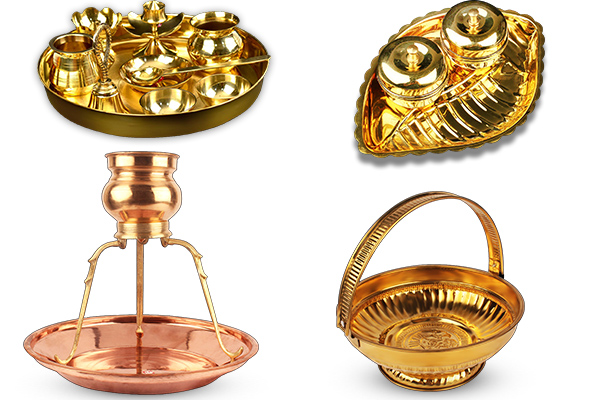
Rudra Centre brings an extensive collection of Puja Articles which caters to all that is required for daily and special Puja Vidhis. We offer variants of designs and sizes in each category. The list includes handcrafted Puja Mandirs, Puja Pedestals, offering Bowls, Panchpatra, intricately carved Puja Thalis, Abhishek Vessels, in different materials, Pure Silver/German Silver articles like Kalash, set of Shodash Upachara and Several other Puja Articles, which we deliver at your doorstep.
19 Mukhi (Face) Nepali Rudraksha
-Nepali-Rudraksha_201997.jpg)
This divine bead is ruled by Bhagwan Narayana who is the supreme of all Bhagwans. The original 19 mukhi rudraksha holds the powers of Bhagwan Narayana and it blesses the wearer with good health, success in all undertakings, immense wealth, and abundance in all spheres. The wearer of the rare 19 mukhi rudraksha bead is blessed with beauty, many virtues, prosperity, and power to fulfil all the desires.
Visit our Exclusive Collection
Vishnu Puja
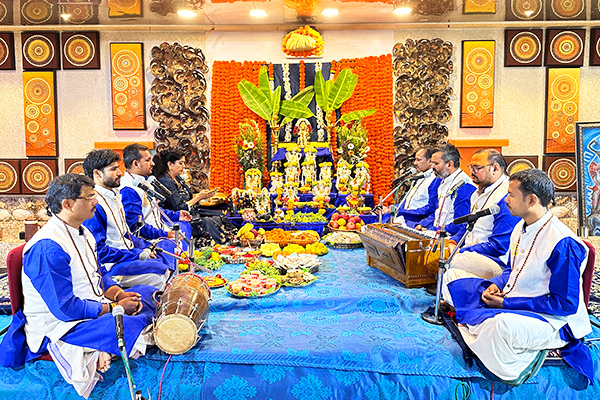
The purpose of performing the Anant Vishnu Puja is to attain blessing of Bhagwan Anant Vishnu and to blessed by materialistic comforts, peace of mind and happiness. This divine form of Bhagwan Vishnu is also worshipped to regain lost wealth. The Vaishnavites, revere Him as the Supreme deity, one who has no beginning and no end.
The benefits of performing the Anant Vishnu puja is as follows:
- Offers divine blessings of Bhagwan Vishnu
- Offers divine blessings of Goddess Lakshmi
- Invites riches and prosperity
- Offers success and growth in all undertakings
- Helps to recover lost wealth
- Offers overall abundance
- Offers contentment and bliss
- Offers protection from negative energies and evil spirits
- Fills life with happiness
Rudra Centre Puja Services is the oldest and most trusted Online Puja Services provider in the world. Over 20 years we have organized Yagnas, Pujas, Homas and Kathas like Ati Rudra Mahayajna, Sahasra Chandi Homa, Akhand Ramayan Paath, Shiva Maha Puran Katha, 4 Prahar Mahashivratri Mahapuja with teams of 100’s of curated priests for the benefit of mankind and our global clientele.
Conclusion
Mohini Ekadashi is a deeply significant and spiritually transformative festival, offering devotees a chance to purify their minds, hearts, and souls. Observing the fast on this day allows one to seek the divine grace of Bhagwan Vishnu, as it is believed to cleanse all sins, remove obstacles, and bring peace and prosperity. The festival emphasizes the power of devotion, self-discipline, and faith in the divine, guiding individuals toward spiritual growth and liberation. The tales of transformation, such as that of King Indradyumna or Dhrishthabuddhi, highlight the profound impact that devotion to Bhagwan Vishnu can have in overcoming life's difficulties and attaining divine blessings.
Ultimately, Mohini Ekadashi is not just a day of fasting but an opportunity to reconnect with one’s higher self, surrender to the divine, and experience the peace that comes from true spiritual devotion. By observing this sacred day with sincerity, one can invite the blessings of Bhagwan Vishnu, find the path to spiritual enlightenment, and achieve lasting contentment in life. The festival reminds us that inner peace and spiritual fulfillment are the greatest treasures we can seek, far beyond material wealth or worldly achievements.


-in-Astrology.jpg)
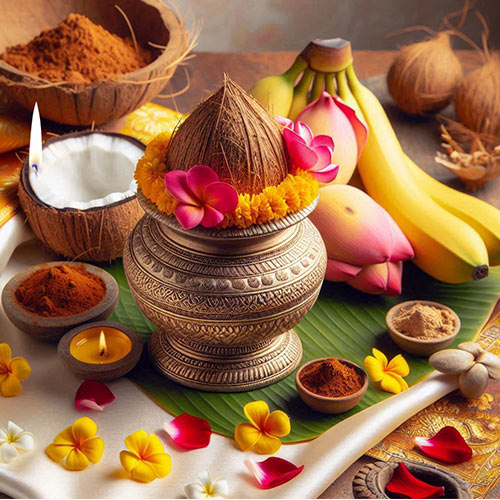
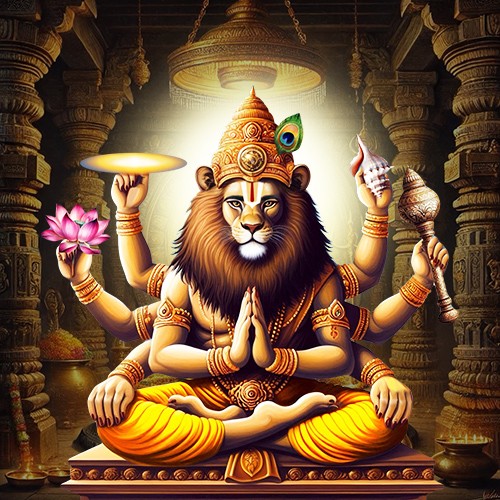
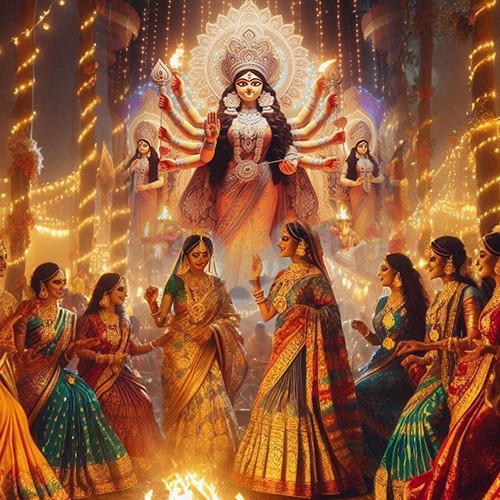
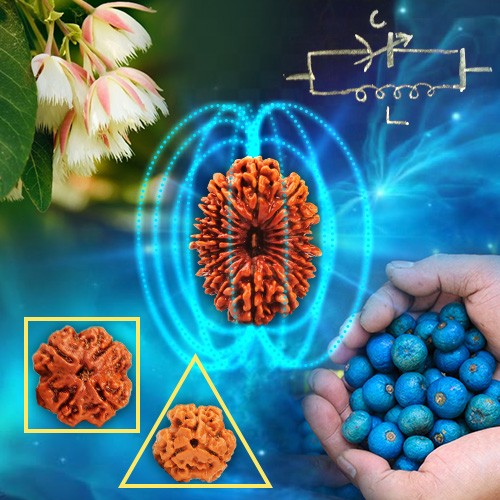

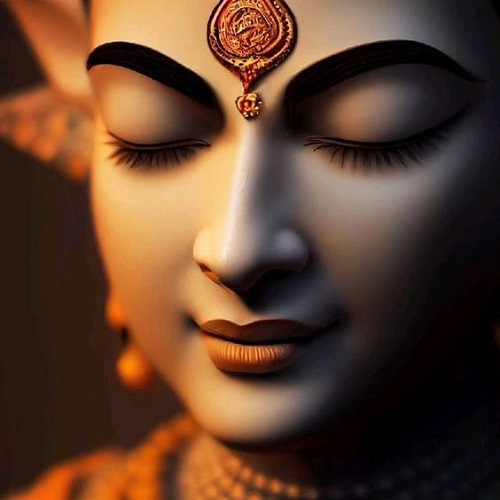
.jpg)
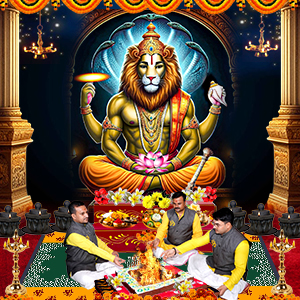
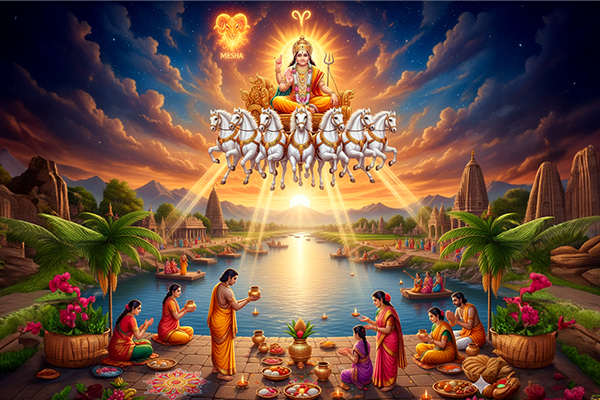
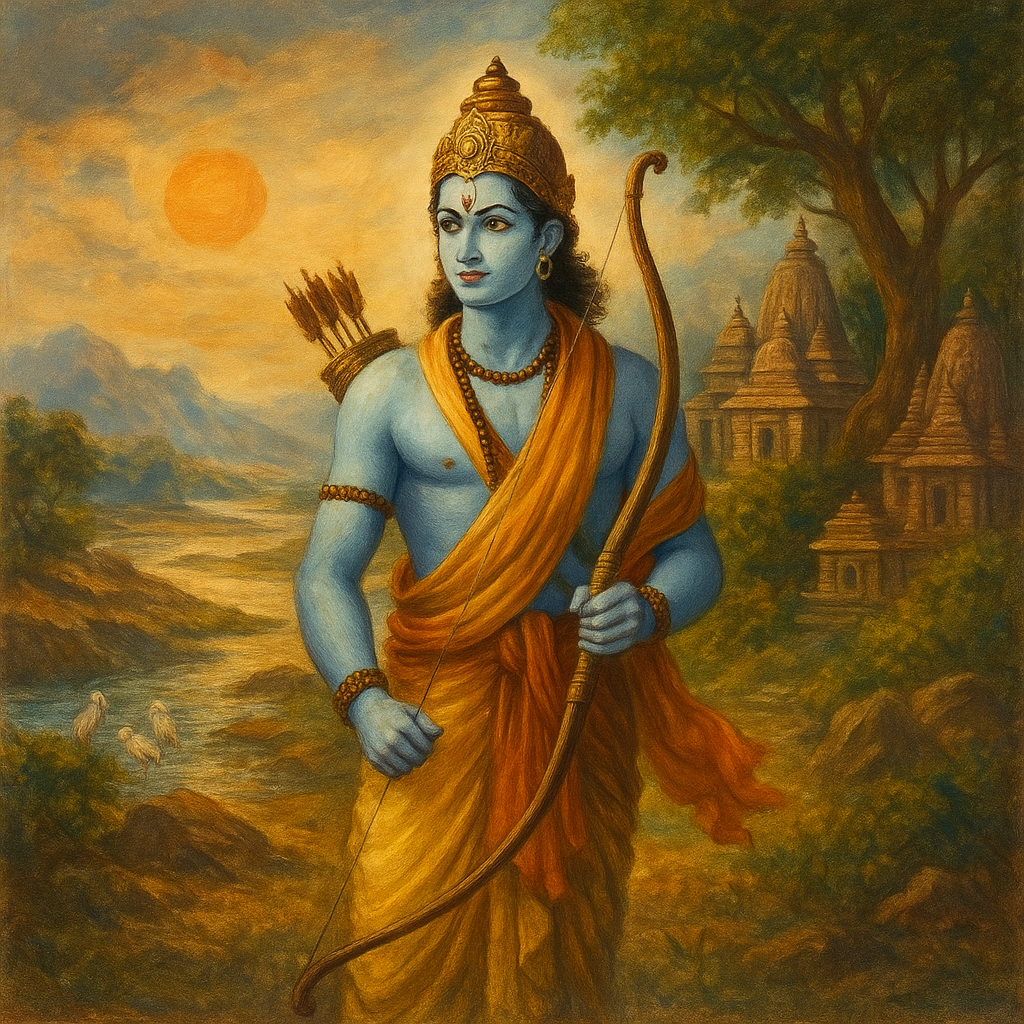
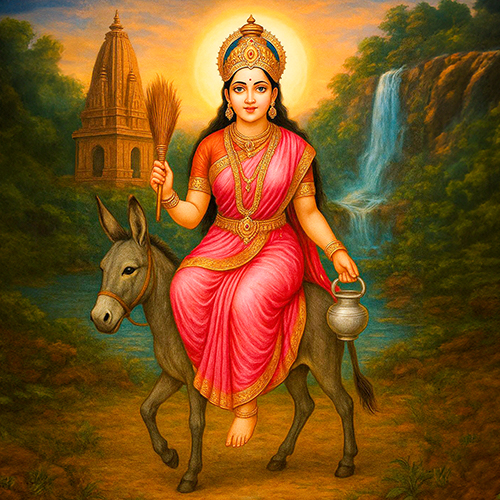
Comments 0
Leave your thought here